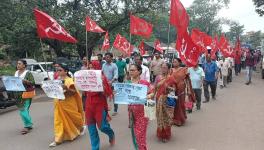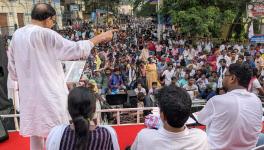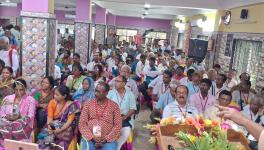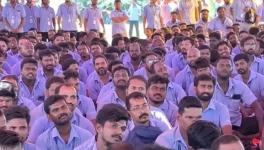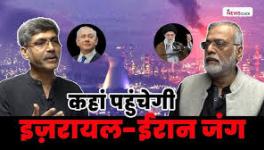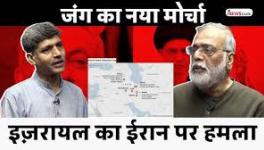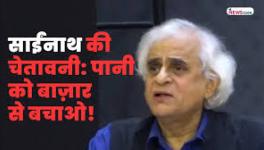Bengal: India’s Defence Production Sector Sees Big Potential in State MSMEs
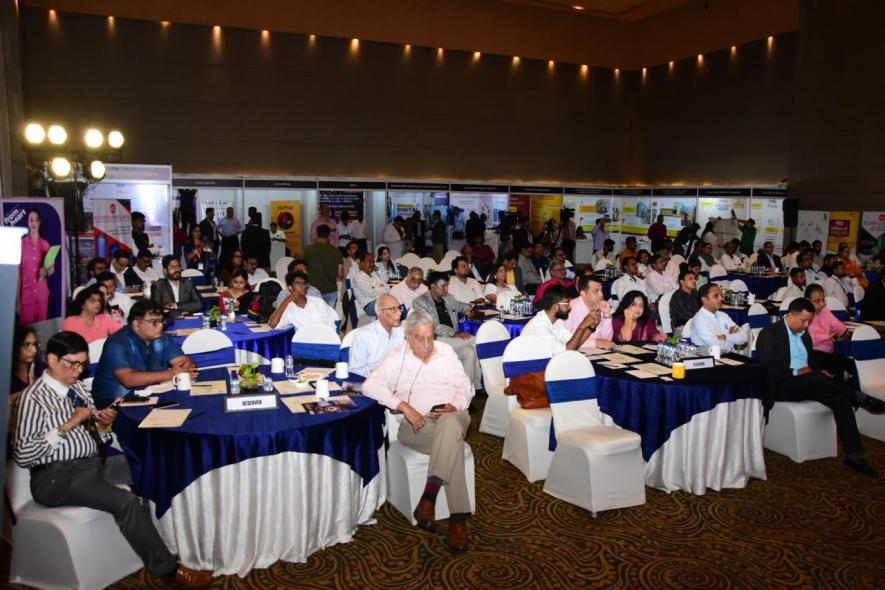
The 4th Edition of World MSME Day Conclave & Awards, organised by the Bengal Chamber of Commerce & Industry, in Kolkata.
Kolkata: The Medium, Small and Micro Enterprises (MSME) sector in West Bengal has been the state economy’s backbone for over 40 years. The sector has 90 lakh enterprises, many of them single-person ones, and employs 1.35 crore people.
“The sector has seen a joyride of over 40 years. During the Left Front government up to 2011, it maintained a lead in the country after Uttar Pradesh. Even now the state MSME sector has held on to its position,” an MSME entrepreneur, requesting anonymity, told NewsClick on the sidelines of ‘The 4th Edition of World MSME Day Conclave & Awards’, organised by the Bengal Chamber of Commerce & Industry (BCC&I) here.
The MSME ecosystem in Bengal has revolved largely around clusters. However, each MSME on an average provides employment to 1.5 people, which is low and indicates that most enterprises in the state are ‘mom & pop’ stores kind of single-person ventures.
About 30% of MSMEs in West Bengal are in the manufacturing sector, which on an average, employ to 15-20 people per unit.
However, defence production units, after the Atmanirbhar Bharat tagline zeroed on indigenisation of produces, are now wooing the MSME sector of West Bengal to produce material required for the country’s defence sector purchases.
Highlighting this at the event held recently in the city, Arunava Bhattacharya, Officer-in-Charge, Quality Assurance ESTT (Naval), Kolkata, proposed that more defence manufacturing needs to emerge from the region with the Armed Forces actively focusing on indigenous manufacturers in all three of its arms -- Army, Navy and Air Force.
Bhattacharya was speaking at the event on the theme ‘Atmanirbhar Bharat: Growing Locally, Competing Globally’, which saw the participation of over 100 MSMEs and the presence of 11 stalls exhibiting innovative products and solutions.
In his welcome address, Subhodip Ghosh, Director General, BCC&I, stressed the importance of MSMEs, which formed the core of the chamber. He promised the delegates that the event would deliberate a gamut of issues, from onboarding to financial issues, from certification to tax compliance and GST (goods and services tax) issues and finally, the sector’s “eternal quest towards optimisation”. He said the state government had conferred on BCC&I the task to work with MSME & and the textiles departments to find out how many MSMEs can be onboarded in the defence value chain.
Arjun Kumar, Additional Director/Scientist ‘F’, DTE of Technology Development Fund, Defence Research and Development Organisation, shed light on the various schemes for MSMEs in the defence sector, such as iDEX and Technology Development Fund (TDF) and lamented the poor penetration of the fund in the Eastern region with only four-five MSMEs being awarded funding under the scheme out of the total 80 awardees.
Indranil Dutta, mentor, National MSME Committee, BCC&I & CEO, Datre Corporation Ltd., pointed out the immense potential of the region due to the presence of good academic institutions creating young talent, and called for devising ways to attract young talent.
Speaking with NewsClick, Sridev Mookerjea, a shipping and engineering professional, who also partners with international institutions and start-ups, including in India, said the MSME sector in West Bengal was a “significant growth engine, leading the country in new unit establishment and women entrepreneurship, while also making substantial contributions to employment.”
However, he pointed out that despite robust growth and proactive government support through various schemes, “the sector still faces challenges, such as access to credit and technological upgrades.”
He said West Bengal leads in terms of the number of MSMEs and women-owned enterprises, often surpassing industrialised Western states, such as Maharashtra and Gujarat in this aspect. However, Maharashtra and Gujarat generally exhibit higher figures in terms of fixed assets and overall industrial output in the MSME sector, indicating a focus on larger-scale manufacturing and potentially more capital-intensive units.
He stressed the need for more MSME manufacturing sectors in West Bengal.
While the state boasts of a high number of MSMEs, a greater focus on manufacturing would definitely boost industrial output, create more diversified and stable employment opportunities, and will further strengthen the state's economic resilience, Mukerjea added.
The MSME sector is the backbone of the Indian economy, driving significant employment generation, contributing substantially to gross domestic product and exports, and fostering entrepreneurship, particularly in rural areas. However, the sector continues to face challenges like limited access to formal credit, technological gaps, and regulatory complexities. Continuous government support and increasing digitalisation offer immense opportunities for the sector's sustained growth and global competitiveness, he said.
Additionally, challenges persist more in West Bengal regarding antiquated technology, mainly for the manufacturing sector MSMEs, inadequate infrastructure and logistics support. These issues collectively hinder productivity, reduce competitiveness, and limit their growth potential. Therefore, increased access to micro-financing with improved terms and conditions is recommended, along with relaxed collateral requirements within reasonable safe limits, he said.
When asked, Indranil Dasgupta, professor at the Indian Statistical Institute and a well-known economist, declined to comment on the “joyride” of the MSME sector, as exhibited in the programmes of the state government or of various chambers of commerce.
“This bubble is a myth and a tale of survival of individuals by opening up roadside shops after big industries in the state closed down,” he said.
Dasgupta said most of these MSMEs, being in the non-productive sector, do not result in creating more assets or employment.
“Unless and until big industries are set up in the state and MSMEs grow as ancillaries, no real growth is possible in this sector,” he added.
The main cradle of MSMES in the state, in Howrah, also known as the ‘Sheffield of the East,’ has also fallen silent, as most of the big units on which their work depended, have shifted base elsewhere in the country.
Talking to NewsClick on the plight of MSMEs in the state, Anadi Sahu, a trade union leader and president of Centre of Indian Trade Union’s Bengal unit, said although some enterprises, of late, had come up on the sides of national and state highways, no labour laws were being adhered to. “The eight-hour work norm is also not adhered too. During the Left Front government’s rule (till 2011), the situation was much better… now the Minimum Wages Act is being flouted in the MSME sector,” he said, alleging that the “extortion bids” by ruling Trinamool Congress members “knows no limit” and the owners were under “huge pressure” because of this.
Get the latest reports & analysis with people's perspective on Protests, movements & deep analytical videos, discussions of the current affairs in your Telegram app. Subscribe to NewsClick's Telegram channel & get Real-Time updates on stories, as they get published on our website.










